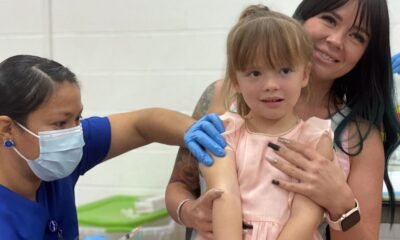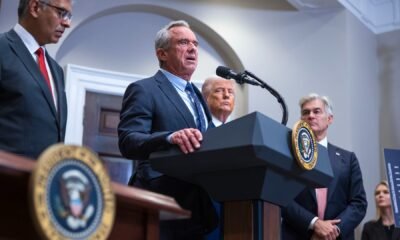DC Bureau
RFK Jr. Promises ‘Make America Healthy Again’ Report Will Respect Farmers

WASHINGTON — U.S. Health and Human Services Secretary Robert F. Kennedy Jr. testified before Congress on Tuesday, asserting that an upcoming report from his agency will not criticize farmers or commonly used pesticides. The report, titled “Make America Healthy Again,” is set for release Thursday.
Kennedy has a history of critiquing elements of modern agriculture. During the Senate hearing, he urged lawmakers to read the anticipated report without delving into potential recommendations. “Everybody will see the report,” he stated, emphasizing his commitment to American farmers. “The MAHA movement collapses if we can’t partner with the American farmer in producing a safe, robust, and abundant food supply,” Kennedy added.
His remarks followed sharp inquiries from Mississippi Republican Senator Cindy Hyde-Smith. She cited reports suggesting the MAHA Commission might unjustly target American agriculture. “If Americans lose confidence in the safety of our food supply,” she warned, “public health will be at risk.” Hyde-Smith underscored that threats to a nation’s food supply could lead to dire consequences.
The Senator probed Kennedy about his background in environmental law and whether it might introduce bias into the report. She specifically questioned if he would reassess the approval for glyphosate, a widely used herbicide deemed safe by numerous studies. “Have you been able to review thousands of studies in a matter of months?” she inquired. Kennedy countered her concerns, asserting that her understanding of the report was erroneous and there was nothing in it to worry farmers.
Other Republicans in the Senate Appropriations Labor-HHS-Education Subcommittee also expressed doubts about Kennedy’s leadership. Maine Senator Susan Collins highlighted the significance of the Low Income Home Energy Assistance Program (LIHEAP), which had faced scrutiny under the Trump administration. “The LIHEAP program is vital for thousands of older Mainers and low-income families,” she remarked.
Kennedy distanced himself from the Trump budget request, affirming the program’s historical importance. He noted that energy policies should reduce costs, alleviating some of the program’s necessity.
Senator Shelley Moore Capito raised issues regarding changes in funding for the National Institutes of Health (NIH) and how it impacts medical schools and research institutions. The NIH proposed a standard indirect cost rate that was substantially lower than previously negotiated amounts, drawing criticism from educational institutions. Kennedy mentioned that adjustments were being considered to ensure these schools received necessary funding.
In discussions about public health, Kansas Senator Jerry Moran inquired about resources needed to address a measles outbreak in his state. Kennedy underscored that vaccination remains the most effective strategy for prevention.
Additionally, South Dakota Senator Mike Rounds called for action to address staffing issues at the National Institute for Occupational Safety and Health. The recent layoffs impacted mine safety efforts, threatening essential support for mining education and safety programs. Kennedy promised collaboration to rectify these issues.
On the topic of Head Start, Alabama Senator Katie Britt asked about funding prospects. Kennedy indicated that eliminating the program would be unlikely in the upcoming budget request but refrained from giving specific dollar amounts. He emphasized the program’s critical role in supporting disadvantaged children and pledged to improve its food quality.


















